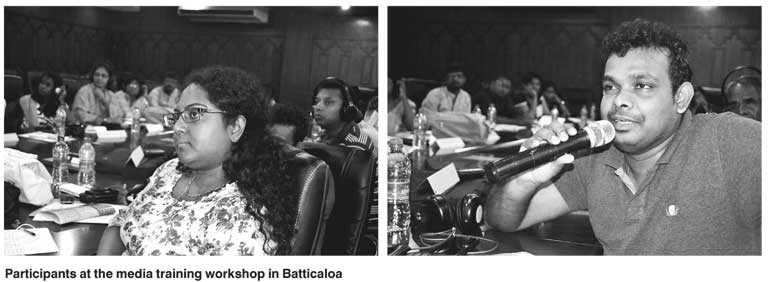Thursday Feb 19, 2026
Thursday Feb 19, 2026
Saturday, 12 November 2016 01:59 - - {{hitsCtrl.values.hits}}
Media in Cooperation and Transition GmbH, the Press Complaints Commission of Sri Lanka
(PCCSL) and the Media Resource and Training Centre (MRTC) have partnered to train Tamil and Sinhalese media professionals in constructive/ethical reporting. The project is funded by the European Union.
“Constructive news is an approach which aims to empower audiences with a more accurate and balanced picture of society,” said Ulrik Haagerup, Executive Director of News at the Danish
Broadcasting Corporation and founder of the concept of constructive news, during his keynote speech to the Sri Lankan journalists, “while using open-minded journalism to find answers and possible solutions regarding the issues facing it.”

Last month, 25 journalists from all over Sri Lanka met in Batticaloa to discuss how media can play a role in combating polarisation of society, with the ultimate goal of propelling reconciliation in the country. The training forms an integral part of the project ‘The Catamaran’ (www.thecatamaran.org), a tri-lingual portal publishing work by journalists from all over Sri Lanka.
Original reporting is available for free syndication to Sri Lankan and international media.
Speaking about the project, Libuse Soukupova, Head of Cooperation of the Delegation of the
European Union to Sri Lanka and the Maldives said, “Serious and responsible reporting is challenging in competitive media markets. This project should help to increase capacity of media, as well as build peace and social consensus in addition to keeping citizens engaged in matters related to reconciliation.”
The three-day training included lectures by Maarja Kadajane, Business Development Manager of the Eurovision Academy, the training institute associated with the European Broadcasting Union, and Editor-in-Chief of The Catamaran news website, Sven Recker. During the workshop, journalists successfully adapted the idea of constructive news to their context and looked for topics that could fit to this approach. This new approach will have an impact to the reconciliation process in Sri Lanka. The results will soon be published on www.thecatamaran.org.
The Catamaran is a project run by the Berlin-based organisation, Media in Cooperation and Transition. The project is funded by the European Union and the German Federal Ministry for Economic Cooperation and Development.